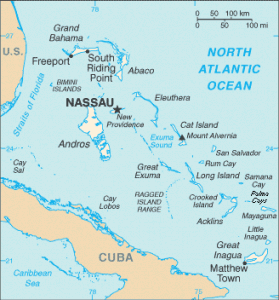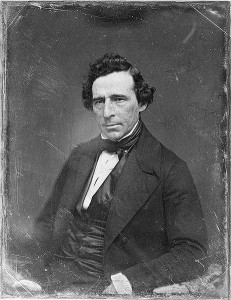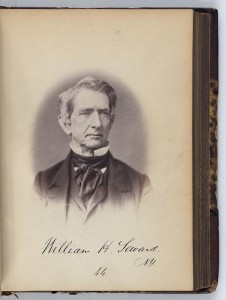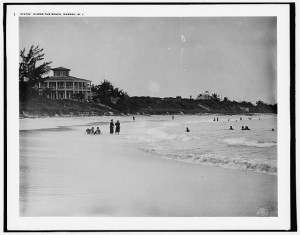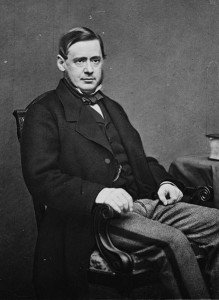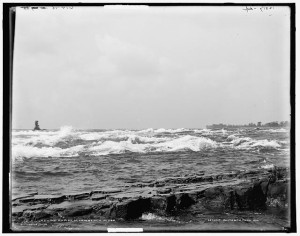As early as May, 1861 pro-Union Americans in Europe sent a battery of cannon to the U.S. government. Among the several alleged anti-Union acts detailed here, a British subject living in New York City is trying to induce a ship’s captain to transport cannon from Nassau in the West Indies to North Carolina for use by the CSA.
From The New-York Times September 4, 1861:
MORE ARRESTS OF ALLEGED TRAITORS.
JOHN C. RAHMING, a merchant of this City, was arrested on Monday night at the instance of the Secretary of State, and confined with the rebels, traitors, and other enemies of the Government, at Fort Lafayette. He is charged with having held out inducements to the Captain of the schooner called the Arctic, to take a trip to Nassau, N.P., and convey thence a number of cannon to Wilmington, N.C., for the use of the Secessionists. The Captain having a fear that he should be unable to run the blockade, withstood Mr. RAHMING’s offer, which was of a tempting character, and the cannon, as far as is known to the contrary, are still at the Bahamas. The prisoner is a West Indian by birth, and carried on business at No. 36 South-street.
On Monday, a merchant named DANIEL CONNELL was arrested by Detective EUSTACE for using seditious language toward the Government. He gave utterance to his treasonable sentiments while addressing a few individuals in front of the Park Barracks. Superintendent KENNEDY did not regard the evidence sufficient to warrant his detention, and he was discharged.
Mr. CHARLES BUTTERFIELD, also a merchant, was arrested by Officer LEWIS, of the Fifteenth Ward, on suspicion of holding treasonable communication with the rebels. In this case also the testimony did not sustain the allegation, and the accused was dismissed from custody.
Yesterday afternoon, Detective ROACH and Officer RILEY, of the Sixteenth Ward, found a man in the Park actively engaged in dissuading men from enlisting at the recruiting tents. His arguments against the Government were, that it was bankrupt, and that the war was unholy — a crusade against our own kindred. In one instance he deterred a man from joining the Sixty-ninth Regiment, and as he appeared to be doing much mischief with his artful tongue, the officers led him to Police Head-quarters. He is now confined there, pending an examination. He is an Englishman, of considerable intelligence, about 30 years of age, JOHN CASSIDY by name, and says that he lives in Middletown, N.J.
Yesterday, United States Marshal MURRAY arrested the editor of the Greenport (L.I.) Republican, in this City, and sent him immediately to Fort Lafayette. Some days ago, the Marshal received several copies of the paper from parties in Greenport, accompanied by an inquiry as to whether the United States Government ought not to arrest the editor. The copies were sent on to Washington, and soon afterward the Marshal received an order for his arrest. He was seized just as he was getting on board the cars, on his way to the Democratic State Convention.
Fort Lafayette sure is getting used a lot.
John Alexander Kennedy became New York City police superintendent in 1860. He was severely beaten by a mob during the July, 1863 draft riots.
Even today The Bahamas is a British Commonwealth. From Wikipedia:
After American independence, some 7,300 Loyalists and their slaves moved to The Bahamas from New York, Florida, and The Carolinas. These Loyalists established plantations on several islands and became a political force in the capital. The small population became mostly African from this point on.
The British abolished the slave trade in 1807, which led to the forced settlement on Bahamian islands of thousands of Africans liberated from slave ships by the Royal Navy. Slavery itself was finally abolished in the British Empire on August 1.1834.
You can read more about the case of JOHN C. RAHMING at Simmons Games, which reproduces The Official Records of the war. Seward ordered Rahming released on September 14, 1861 if Rahming posted a bond with a $2500 penalty and promised to do nothing else hostile to the United States while living here.
The Official records include correspondence between Secretary Seward and Richard Lyons, 1st Viscount Lyons, the British envoy in Washington. On October 14, 1861 Lyons wrote Seward a letter in which he expressed concern that the American constitutional guarantee of habeas corpus was not being followed:
WASHINGTON, October 14, 1861.
Hon. WILLIAM H. SEWARD, &c.
SIR: Her Majesty’s Government were much concerned to find that two British subjects, Mr. Patrick and Mr. Rahming, had been subjected to arbitrary arrest, and although they had learned from a telegraphic dispatch from me that Mr. Patrick had been released they could not but regard the matter as one requiring their very serious consideration. Her Majesty’s Government perceive that when British subjects as well as American citizens are arrested they are immediately transferred to a military prison and that the military authorities refuse to pay obedience to a writ of habeas corpus. Her Majesty’s Government conceive that this practice is directly opposed to the maxim of the Constitution of the United States that no person shall be deprived of life, liberty or property without due process of law.
Her Majesty’s Government are willing, however, to make every allowance for the hard necessities of a time of internal trouble, and they would not have been surprised if the ordinary securities of personal liberty had been temporarily suspended nor would they have complained if British subjects falling under suspicion had suffered from the consequences of that suspension. But it does not appear that Congress has sanctioned in this respect any departure from the due course of law, and it is in these circumstances that the law officers of the Crown have advised Her Majesty’s Government that the arbitrary arrests of British subjects are illegal.
So far as it appears to Her Majesty’s Government the Secretary of State of the United States exercises upon the reports of spies and informers the power of depriving British subjects of their liberty, of retaining them in prison or liberating them by his own will and pleasure. Her Majesty’s Government cannot but regard this despotic and arbitrary power as inconsistent with the Constitution of the United States; as at variance with the treaties of amity subsisting between the two nations and as tending to prevent the resort of British subjects to the United States for purposes of trade and industry.
Her Majesty’s Government have therefore felt bound to instruct me to remonstrate against such irregular proceedings and to say that in their opinion the authority of Congress is necessary in order to justify the arbitrary arrest and imprisonment of British subjects.
I have the honor to be, sir, with the highest consideration, your most obedient, humble servant,
LYONS.
Finally, there is some evidence that the Arctic ran aground with a load of peas at Montreal in November 1861. Some of the captain’s crew might have preferred risking the blockade.

